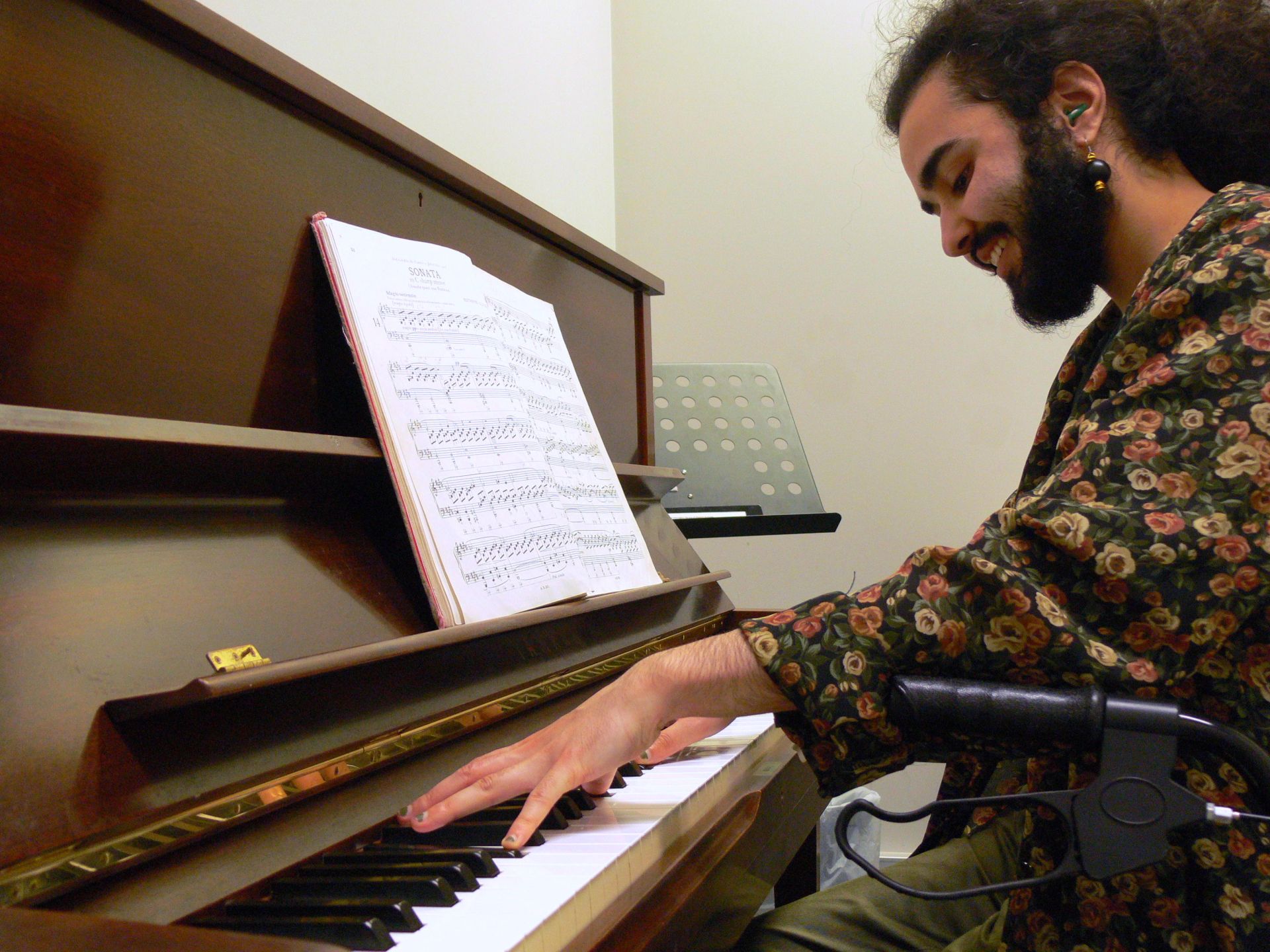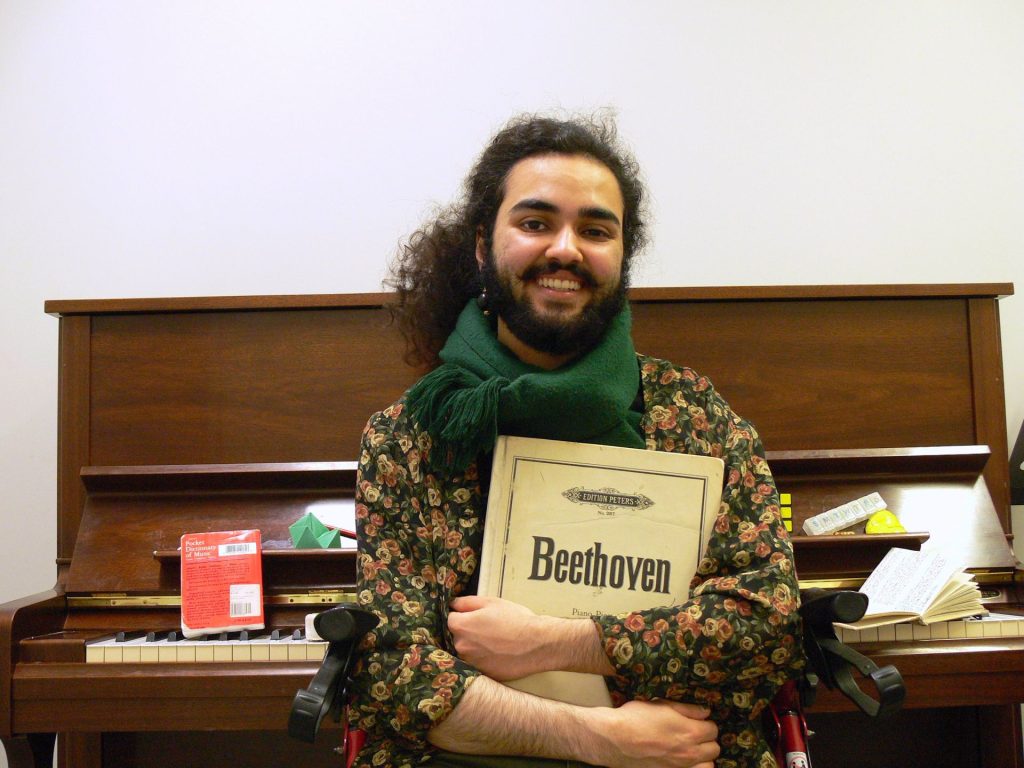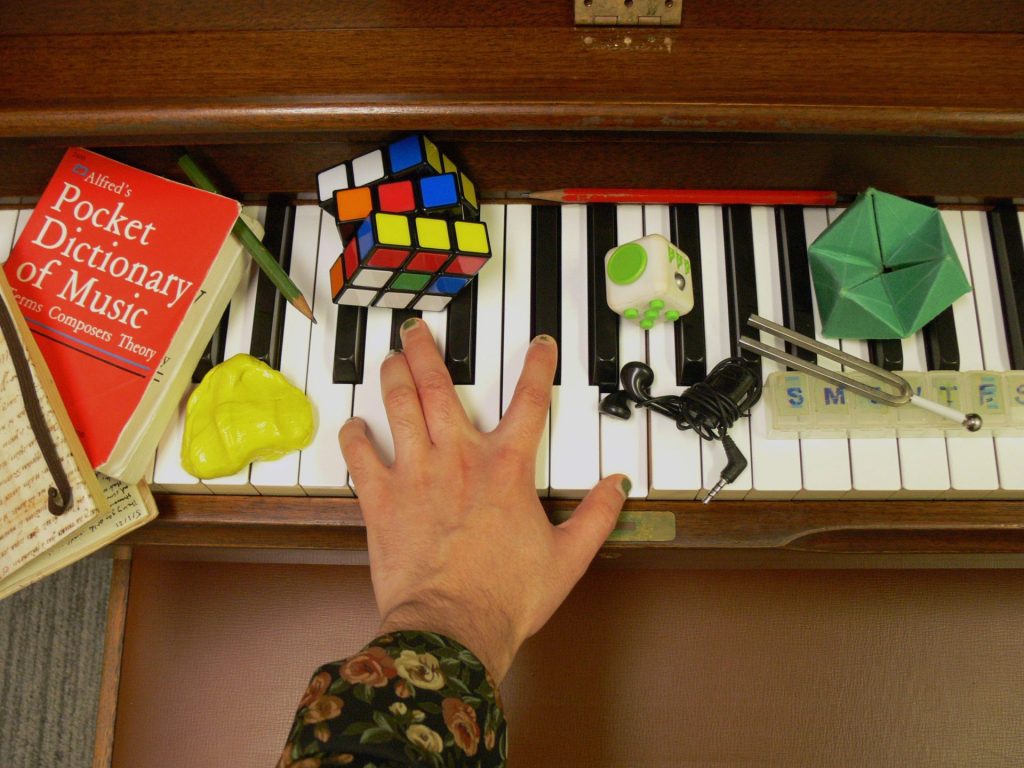In this two-act, multidisciplinary play, arts writer and former piano student Patrick Gunasekera are commissioned for a lecture on disability and art history. When he chooses to present on neurodivergent composers of the Western music canon, it triggers a hallucination with the ghost of Beethoven. Together, they learn to reckon with the complicated lengths they’ve gone to survive, create, and succeed in ableist societies.
The first creative development of Composers in Crip Time will see an all-neurodivergent team explore the play’s personal and historical stories, rehearse piano works to be performed in the play, and research how neurodivergent artists use our crip scholarship (Pipezna-Samarsinha, 2018) as a collaborative methodology in arts institutions. The Composers in Crip Time residency will also facilitate a community event for elders of mental health activism, and a workshop for Deaf and disabled artists of all disciplines and identities who have an interest in autobiographical work.
Workshop: Autobiographical storytelling for Deaf and disabled artists
Applications for this workshop are now closed.
19–22 June
PICA Performance Space and Zoom
“Autobiographical work” refers to art based on the artist’s own life, and may include reflections on society or lived experiences that deepen the artist’s understanding of who they are. Autobiographical work can be created in any medium.
Over the week, ten artists with the facilitator will discuss, reflect, create and collaborate on matters relevant to our work, including:
- What does consensual storytelling mean to us when our vulnerability and knowledge is often exploited? How do we know when we really want to share our stories?
- How do our voices change when we exist and work independently from industry, institutional, and non-disabled frameworks?
- What are the structural, social, cultural, and internalised barriers that hold us back from creating work that could liberate us?
- What creative and personal strategies do we have to both safely and daringly turn our lived experiences into art?
- How does the labour and rigour of surviving ableism change our creative work? How do we find creative lives like ours in our cultural histories?
- We rarely have the privilege to share our stories just for ourselves – what might happen if we do?
This workshop invites participants to expand on our own methodologies, connect with the radical history and contemporary power of disabled autobiographical storytellers, and gain a stronger embodied understanding of what cultural and emotional integrity mean to us as Deaf and disabled artists.
How to Apply
Patrick is inviting artists to have a casual conversation, through a medium that suits you, about the workshop, its objectives, and what you want to gain from it.
Or:
“Patrick Gunasekera” on Messenger
Voice messages and Auslan videos are warmly welcomed.
These conversations are just about building community as Deaf and disabled artists, and talking together about the many current priorities in our individual and collective practices.
Any artists who aren’t selected to participate in the workshop will be given brief feedback about this decision by Friday 19 May.
This month of conversations is also likely to raise new ways of thinking, working and connecting amongst WA’s Deaf and disabled artists. It’s possible that any relevant opportunities that come from this can be shared with all interested artists too.
Additional Details
The exact workshop schedule will be designed around participating artists’ access needs and availability. The workshop is free to attend. The team behind the workshop are applying for funding to support all participants with a $1,000 stipend. This outcome is not guaranteed, and we can discuss in our conversation if you would still want to participate in this workshop if you weren’t paid. Your choice will not affect your application outcome.
About the Facilitator

Patrick Gunasekera (he/him) is an independent artist and systemic advocate of Sri Lankan migrant heritage, living in Whadjuk Noongar Boodjar. His theatre, poetry, arts writing and award-winning essays explore how everyday people become complicit in violence when disrespect is normalised, and how legacies of intergenerational trauma can be transformed through honesty, individuality and solidarity. With life-long and evolving practices as an actor, dancer, singer and pianist, he approaches performance as a way of understanding the embodied knowledge of marginalised people and reclaiming agency and emotional integrity in the body.
He has worked in arts journalism since 2019, exclusively covering the work of young, multicultural, queer and disabled artists. In the last few years, his wide-ranging contributions to the industry have provoked and empowered in equal measure, supporting many arts organisations and communities to improve cultural safety, opportunities for, and solidarity with underrepresented artists.
His published writing is in Archer Magazine’s “Disabilities” issue, Australian Poetry Journal’s “resist” issue, Cordite Poetry Review, Voiceworks, Pulch Mag, and the anthologies Growing Up Disabled in Australia (ed. Carly Findlay, Black Inc. 2021) and To Hold the Clouds (ed. Camha Pham, Centre for Stories 2020). He has also been a featured writer at Red Room Poetry WA Showcase 2021, Perth Festival Literature & Ideas Weekend 2020, Emerging Writers’ Festival 2020, and Digital Writers’ Festival 2018. He has been a theatre, performance and visual arts reviewer at Pelican Magazine and Seesaw Magazine, and his extended essay long-awaited dream/interwoven zeitgeist/the pulse of A ferocious future everyday (Midsumma Blog 2020) received the 2021 Dal Stivens Award from the Australia Council for the Arts.
His performance works have been produced at People with Disabilities WA Inaugural State Conference (Unapologetic, co-created with Daley Rangi and Adam Kelly, Bendat Community Centre 2020), Midsumma Festival (Queerantines in the Flesh, ACMI 2021) and artist-run initiatives Outcome Unknown, Dada-Desi (Sihinaye Mava, Abbotsford Convent with Sangam Festival 2021), KISS club (A decolonial history of the avant grade, PICA with pvi collective 2019), and Häxa House. He is currently practising contact improvisation and contemporary dance with older dancers, queering and cripping interpretations of classical piano performance, and writing a two-act play for mainstage with an all-disabled artistic team.
About the Composers in Crip Time Team
Sun–Mi Clyburn
Is a Perth-based producer, writer, spoken word artist and theatre maker of African American and French heritage. She was born on the east coast of the USA where she spent the first seven years of her life. The next fourteen she lived in Poland, in Eastern Europe, which greatly influenced her writing as she draws inspiration from Central European revolutionary romanticism, dystopian and wartime literature and surrealism. The main motifs she explores in her writing and art include love, loss, death, grief, fragmented identity and finding home.
Since 2015 she has worked as a live performance reviewer for The Music and Around The Sound and recently joined the writing and reviewing team at Magazine 6000. She has been heavily involved with the Perth FRINGE WORLD FESTIVAL as performer and producer since 2015 – including successful seasons in the State Theatre Centre (In/compatible 2017) and Downstairs at His Majesty’s Theatre (Audiotherapy 2018 & 2019) – and as director in 2022 (YAAAS KWEEN). She was also a performer in the punk-rock musical 107 at The Blue Room Theatre in 2022, written by Michele Gould and directed by Daley Rangi. She is currently developing a few theatre productions about trauma, mental health, homelessness and racism, including Mararo Wangai’s 3NVersus as producer and collaborator. She is also a facilitator and curator for events hosted by Centre for Stories and their new space in the Perth CBD, Story Lounge.
Rafeif Ismail
Is an award-winning emerging multilingual writer and dramatist from Boorloo, WA (colonially known as Perth). Rafeif’s work explores the themes of home, belonging and the so-called ‘Australian’ identity in the 21st century through the lens of a refugee and third culture youth of the Sudanese diaspora.
Rafeif is the current managing director of Djed Press and a participant in the 2020 AFTRS National Talent Camp and 2021 Equity Foundation Screen Diversity Showcase. Rafeif learned English by reading comic books and relearned her first language (Sudanese Arabic) by reading poetry. Rafeif saw Black Panther about 28 times in cinema and can stand with the best of them on Doctor Who and Star Trek trivia.
Rafeif sees all forms of art as mediums for change and she is committed to creating accessible spaces for young people of marginalised backgrounds in the arts, because, in the words of Arundhati Roy: “there’s really no such thing as the ‘voiceless’. There are only the deliberately silenced, or the preferably unheard.” Rafeif is committed to creating stories that explore the rich diversity of this world, hoping that stories everyone can relate to will be available across all mediums.
Rafeif is also the winner of the 2022 Arts Access Australia National Leadership Award, and a student of Humanities in Health and Medicine at UWA.
Peter Blockey
Was born profoundly Deaf in Harvey into a family with 4 hearing brothers & parents. Being the only Deaf person in the family, Peter is also the only artist (… “that I know of!”). He has always had a passion for music and wrote many poems growing up, and as an adult. The catalyst for wanting to start expressing himself through the Arts came in 1986, when Peter learned about Marlee Matlin becoming the first deaf recipient of the best actress Oscar for her role in the film “Children of a Lesser God,” and he was filled with pride that a Deaf person could achieve such an accomplishment.
Peter has now made 4 music videos, from his poems. He has presented his videos on 4 different occasions, including for “Flow Festival” in both 2019 and in 2021. He has participated in paid inclusive workshops through the past decade, including with Jenny Sealey from the National Disability Theatre in the UK, for the Perth International Arts Festival (PIAF) in 2017, as well as having been on the Access Advisory Committee for Perth Festival from December 2019 – 2020, which was a year-long paid position.
Peter was Producer, Director & Performer in The Lifetime of Deaf & Deafblind at The Blue Room Theatre in Januray 2023, which received reviews of 5 stars. The cast team of 5 people, one Deaf, one Deafblind and three hearing, performed in Auslan with signed songs and theatrical storytelling, and received reviews of 5 stars. Peter was also Writer & Performer in Deafinite Connection at Fringe Festival in 2022.
Tiffany Ha
Is a pianist, composer, educator and Gestalt practitioner based in Walyalup (Fremantle). Born in Australia to Hoa refugees, her work is concerned with identity, integration, and healing through cultivating relationships and giving expression to silenced voices. Tiffany identifies as neurodivergent and aims to challenge and reimagine the ways music is taught, shared, and valued in our culture. In 2012, after completing her music degree at UWA, Tiffany was awarded the Schenberg Music Prize for Composition and traveled to New York to study with composer Joan La Barbara and the Meredith Monk Vocal Ensemble. When she returned to Perth, she worked with several community choirs as a singer, arranger, coach and director. As a solo artist, Tiffany creates contemporary experimental piano pieces which range from fully improvised ‘sketches’ to formally structured, composed works. In 2022 Tiffany launched Inner Voice Piano, a private practice studio offering a unique blend of piano lessons and Gestalt Therapy, underpinned by the principles of somatic awareness, field theory, and creative adaptation.
Ben Quick
Is a youth drama teacher and neuroscience student, active in student theatre as a performer and deviser. His disability advocacy on campus has established a number of quiet spaces at UWA, a project that’s still growing to this day. Recent theatre credits with the University Pantomime Society include The Little Good Wolf (2022, 2023) and Rudolph the One-Eyed Pirate (2021), both shows exploring othering, self-growth and morality.
Warnings
Composers in Crip Time explores some sensitive subjects for the disability community, in a way that performers with disabilities will be in control of the whole show. Some of the play will discuss high-performance pressures, self-image, class struggles, institutional ableism, family trauma, and suicide ideation with a message of hope. A counsellor with lived experience of disability will be available to speak with at both showings. We will prioritise booking a counsellor who can converse in English and Auslan.
Accessibility
People attending events in person will be asked to wear masks if they can and if they are not signing.
All workshops and script readings will be hybrid events, with a moderated Zoom attendance option.
Speakers will visually describe themselves at all events. The script readings won’t require any visual cues to be described during the readings.
An Auslan interpreter can be booked for all events to assist with accessibility. All floors at PICA have lift access and the Performance Space




